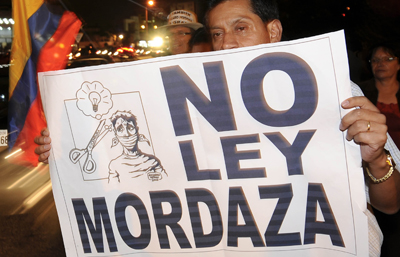Back in April, before leaving on a research trip to Ecuador, I contacted Communications Secretary Fernando Alvarado by phone and email in hopes of meeting with him to discuss press freedom concerns that have emerged under President Rafael Correa. The secretary was among the high-ranking administration officials who did not respond to CPJ’s requests for meetings or to our subsequent efforts to obtain comment for our special report, “Confrontation, repression under Correa’s Ecuador.” So it was interesting to see that a week after the report’s launch in Quito that Alvarado wrote an open letter to CPJ on his personal blog.
“It is not a surprise that the Committee to Protect Journalists reached such absurd conclusions if their sources were Fundamedios, the Association of Ecuadoran Newspaper Editors and Jeannette Hinostroza,” Alvarado wrote, referring to press groups and a Teleamazonas anchor. He also said our recommendations looked as if they were written by opposition politicians.
It’s true, of course, that we interviewed journalists about the state of press freedom. We were interested in the government’s view as well, if Alvarado had agreed to speak with us. Our recommendations are based on the well-documented deterioration of press freedom conditions in Ecuador. Politicians of all stripes should be alarmed by threats to their citizens’ rights to free expression.
While acknowledging that President Correa filed a criminal libel complaint against the daily El Universo, three of its directors, and the former opinion editor, Alvarado argues that libel is not defamation as stated by CPJ and that the op-ed by Emilio Palacio “is not an opinion but libel.” While he is entitled to his views about the case, the parsing of legal terms is a distraction from the larger issue of how Ecuador has violated freedom of expression guarantees enshrined in the national constitution and in international agreements signed by Ecuador.
Alvarado writes that the Ecuadoran government does not silence critics and that the government promotes criticism with a “communications policy that encourages democratization and access to information.” His opinion is contradicted by local and international press groups that have documented dozens of instances of censorship, legal retaliation, and restrictive legislative initiatives since Correa took office in 2007. In terms of access to information, Ecuadoran reporters couldn’t disagree more with the secretary. Journalists working for the private media say access to top officials is nearly impossible. CPJ’s own experience in seeking discussions with the government reinforces that view.
Alvarado doesn’t seem to realize that the same government that “promotes criticism” is the one that regularly pre-empts private news broadcasts to impose its official views. These pre-emptions, by the way, are ordered by Alvarado.
The secretary does not say a word about the constant hostility exhibited by Correa and other top officials toward the private media, nor does he address the abuse of presidential cadenas to lambaste critics. Not a word is written by him about the restrictive communications law being discussed in the National Assembly, which is described by local and international human rights groups as a serious blow to freedom of expression.
In his piece, Alvarado complains that he was barely quoted in our report. We cited the administration’s public positions, but, of course, Alvarado and other officials chose not to discuss them directly with us. It’s a shame that the administration is unwilling to engage with those who question its policies. Doing so would be a good step toward restoring civility and press freedom.
